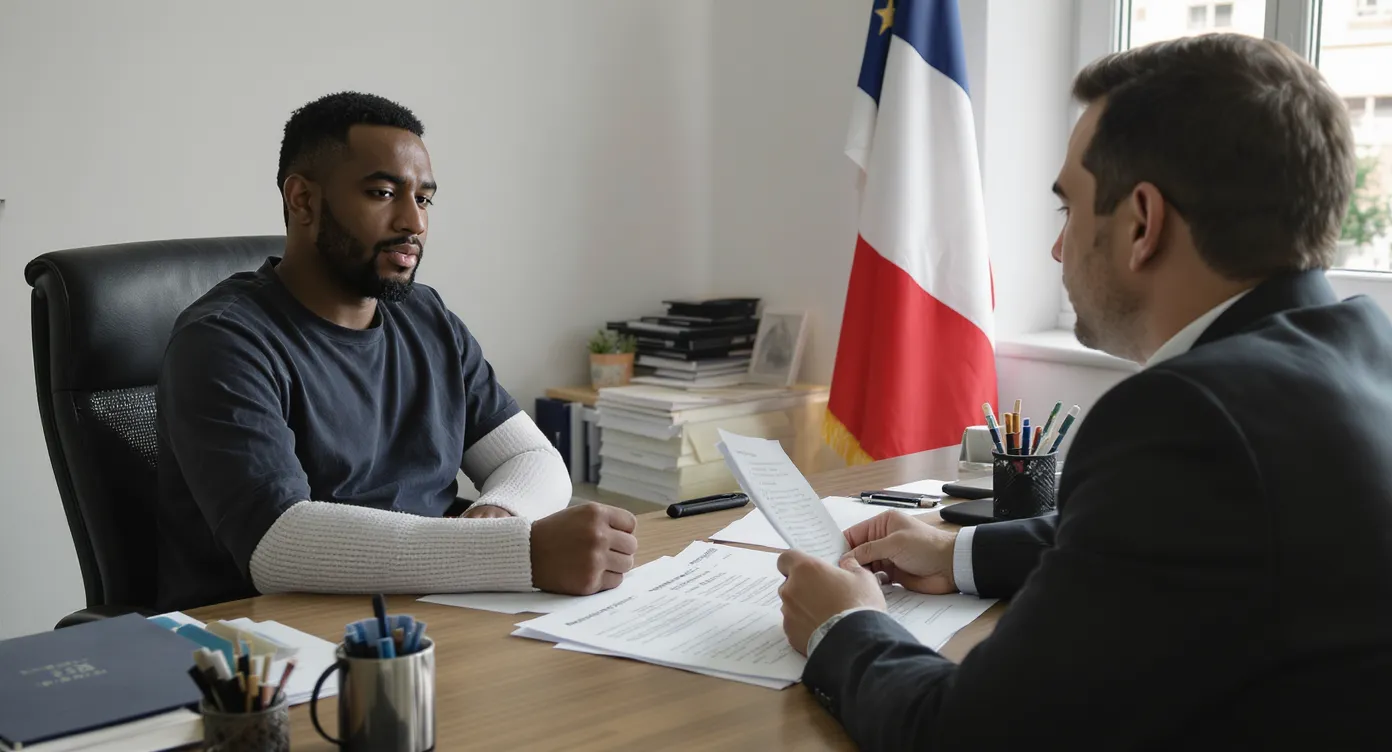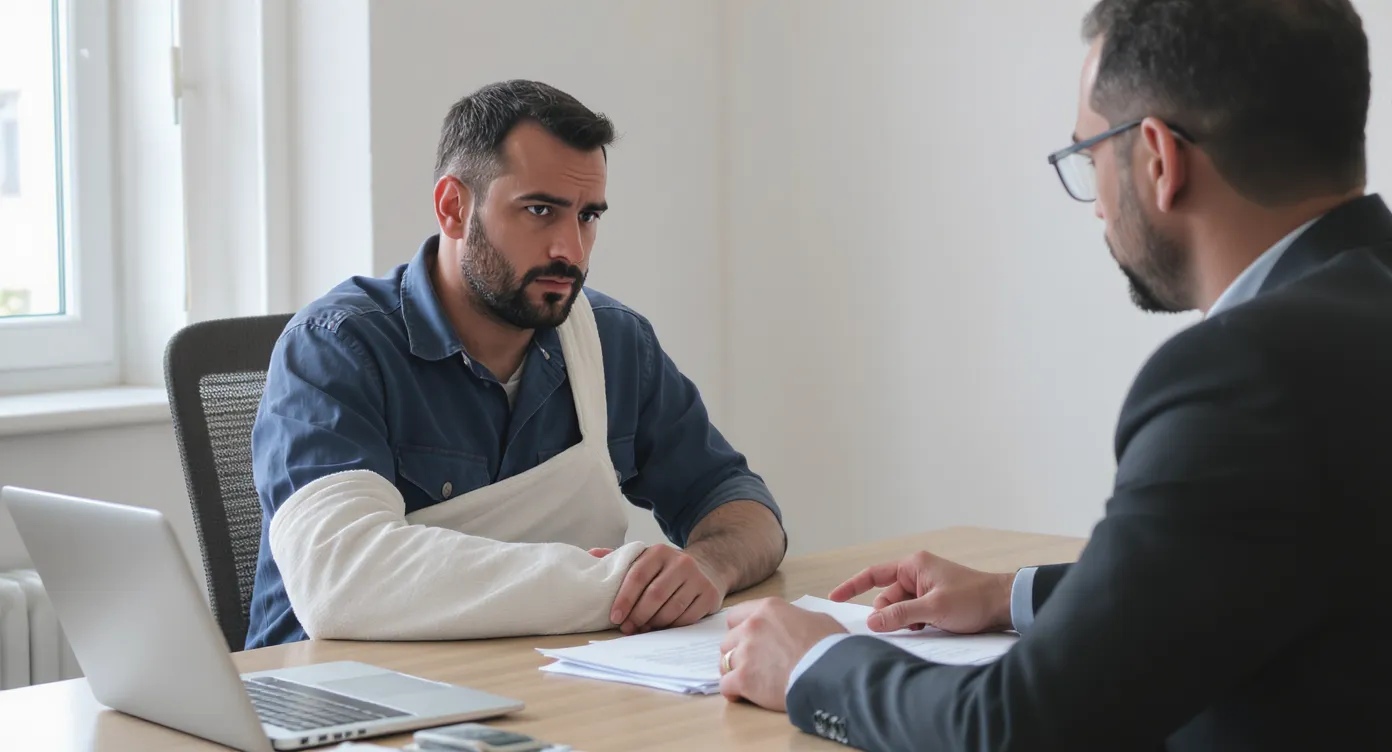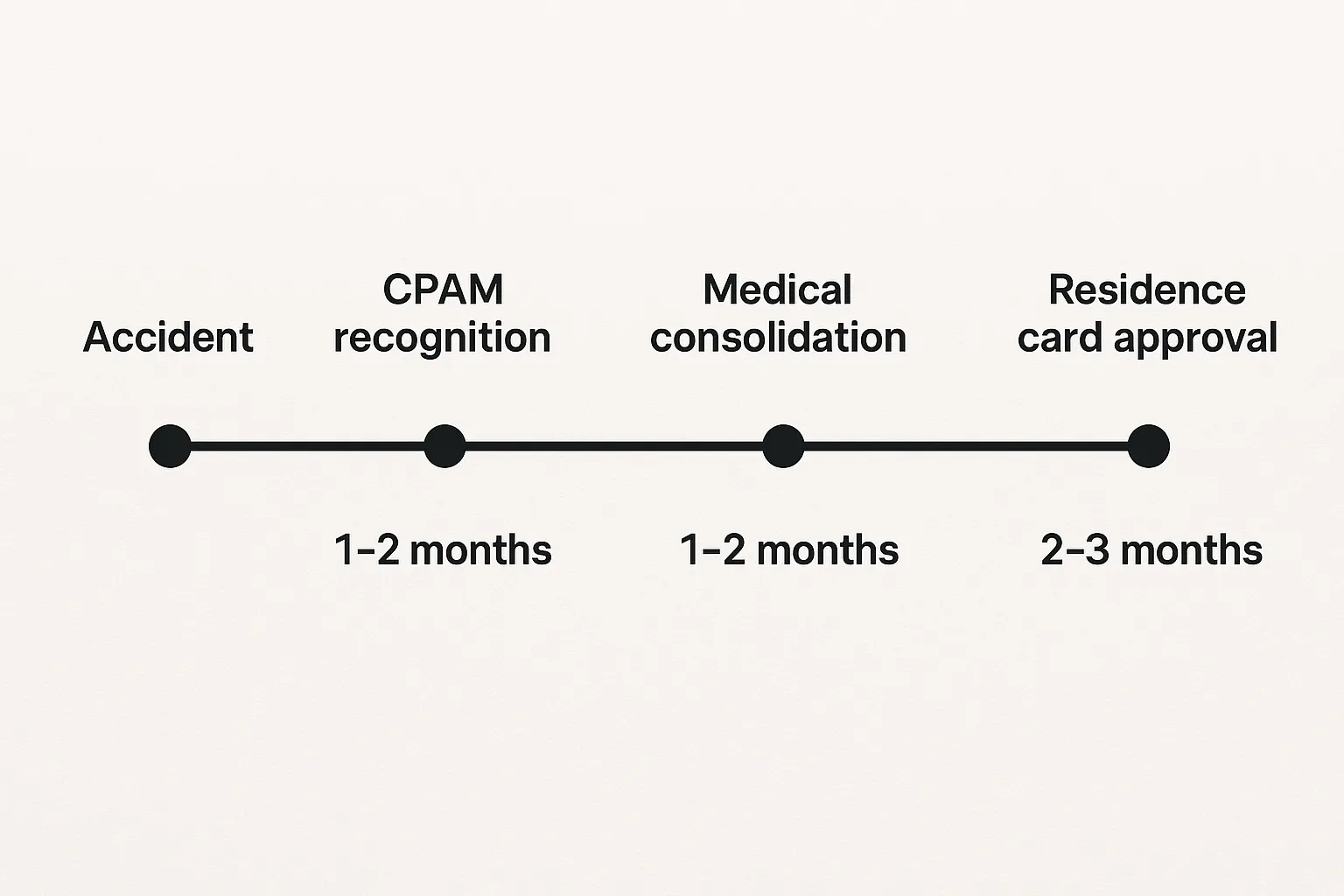Regularization After Industrial Accident: Special Rights Explained

Most undocumented workers in France believe that a serious workplace injury will cost them everything – job, income and any chance of becoming regularised. In reality, French law grants specific immigration protections and a fast-track residence permit when an industrial accident (accident du travail) or occupational disease (maladie professionnelle) has been officially recognised. This guide explains those special rights, who qualifies and the exact steps to secure legal status after an accident, even if you previously held no papers at all.
1. Why an Industrial Accident Changes Your Immigration Landscape
French labour and immigration codes are built on the principle that no one should lose basic rights because of a workplace injury. Two key consequences flow from this principle:
- Health and wage-replacement benefits (daily allowances, medical care and, if applicable, a lifetime incapacity pension) are payable regardless of immigration status once the accident is recognised by CPAM.
- CESEDA article L.425-9 (formerly L.313-11-11°) allows a foreign worker with a permanent disability of at least 20 percent resulting from a French workplace accident or occupational disease to obtain a residence card without a labour-market test.
A June 2023 Ministry of the Interior instruction, reaffirmed in the 2025 Immigration and Integration Act, reminds prefectures that undocumented victims should be prioritised for admission exceptionnelle au séjour when the statutory threshold is met.
2. Who Is Eligible?
The table below summarises the three main pathways that open after an industrial accident.
| Situation | Minimum Medical Condition | Residence Document Issued | Legal Reference |
|---|---|---|---|
| Undocumented or expired permit holder | Permanent partial incapacity (IPP) ≥ 20 % certified by CPAM medical board | 1-year "salarié" or "travailleur temporaire" card, renewable, convertible to 10-year card after 3 renewals | CESEDA L.425-9 |
| Documented worker whose permit will soon expire | Temporary incapacity > 6 months but IPP < 20 % (ongoing treatment) | 6-month provisional authorisation with right to work, renewable until consolidation | Interior Ministry Circular NOR INTK2300147J |
| Victim with IPP < 20 % and no ongoing care | Case-by-case humanitarian regularisation (family life, social ties, work payslips) | "Vie privée et familiale" card or exceptional stay permit | CESEDA L.435-1 + Circular 28 Nov 2012 |
✔ Key point: The 20 percent IPP threshold is set by Social Security doctors, not by the prefecture. You can still start the immigration process before consolidation if medical experts project that the rate will exceed 20 %. ImmiFrance can obtain preliminary certificates to accelerate filing.
3. Immediate Rights After an Accident – Even Without Papers
- Medical coverage: Once the employer files the Cerfa 14463 accident declaration (or you file form S6200 in case of employer refusal), CPAM covers 100 % of related healthcare costs at the official tariff.
- Daily allowances (indemnités journalières): Paid from day 1 based on reported salary. If you were working off the books, the Labour Inspectorate may calculate allowances using payslips of colleagues in the same role.
- Protection against dismissal: Labour Code article L.1226-7 makes any dismissal during medical leave null and void unless the company proves it cannot maintain your position.
- No immediate removal: Since the July 2023 inter-ministerial instruction, prefectures are asked to suspend OQTFs against victims until their medical situation and immigration application are reviewed.
4. Step-by-Step Roadmap to Obtain a Residence Card
Step 1 – Secure Official Recognition
- File the accident declaration within 48 hours if the employer fails to do so.
- Obtain CPAM’s form S6201 "Feuillet accident du travail" acknowledging the claim.
- Attend all medical appointments with the Médecin Conseil. Keep copies of each sick-leave certificate (Cerfa 50069).
Step 2 – Gather the Immigration Dossier
Mandatory documents for the L.425-9 route:
- Passport or valid ID (expired passport accepted if renewal proves impossible).
- Full photocopy of every page of the passport.
- Proof of address (utility bill, attestation d’hébergement, etc.).
- CPAM decision recognising the accident or disease.
- Consolidation certificate with the notified IPP rate or, if consolidation not yet declared, a specialist’s prognosis estimating future IPP ≥ 20 %.
- Payslips covering the 12 months before the accident or alternative proof of actual work (work contracts, bank transfers, witness statements) if you were undeclared.
- Two recent ID photographs meeting ISO/IEC 19794-5.
- A tax stamp of €225 (to be paid only upon approval).
Step 3 – Book the Prefecture Appointment
- Use the ANEF portal if available in your département; otherwise send a registered-mail request citing "Demande de titre de séjour – article L.425-9 CESEDA" with copies of all documents.
- Attach medical documents in a sealed envelope marked "Secret médical – à remettre au médecin de la préfecture"; this prevents clerical staff from accessing sensitive data.
Step 4 – Day of Filing
- Bring originals plus one set of copies.
- Ask for a récépissé valid for six months with the remark "autorise son titulaire à travailler." This provisional document lets you keep receiving allowances and look for suitable work.
Step 5 – Prefecture Decision
- Average processing time in 2024-25: 8 to 14 weeks (source: Senate written reply n° 3421, 2 May 2025).
- Upon approval, pay the €225 tax and collect the biometric card.
- If refused, you have 30 days to lodge an appeal at the Tribunal Administratif. ImmiFrance’s partner lawyers obtain an average annulment rate of 63 % on L.425-9 appeals (internal statistics, 2024).

5. What If Your IPP Is Below 20 Percent?
Not every serious accident crosses the statutory threshold, yet many victims still face job loss and long rehabilitation. Two alternative tracks remain:
- Prolonged Temporary Incapacity: If your sick leave exceeds six months and a return to work is uncertain, ask your doctor for a "certificat médical détaillé" referencing potential permanent consequences. Prefectures often issue a renewable temporary card so you can finish treatment in France.
- Work Regularisation: Use your pre-accident payslips to file under article L.435-1 (admission exceptionnelle au séjour for workers). Our separate checklist on preparing eight payslips explains how to build that file.
Internal link: Prefecture Checklist: Preparing Evidence of 8 Payslips for Work Regularization
6. Compensation and Employer Liability – How a Residence Card Helps
Having legal status is not a prerequisite for financial compensation, but a residence card greatly simplifies:
- Receiving lump-sum indemnities from the employer or insurer after a "faute inexcusable" judgment.
- Opening a French bank account for ongoing annuity payments (rente d’incapacité).
- Accessing Fonds de Garantie des Victimes for supplemental compensation when the employer is insolvent.
Without a titre de séjour, claimants often face blocked transfers and administrative delays that erode the real value of the award.
7. Common Pitfalls to Avoid
- Missing the 48-hour accident declaration window. If you are hospitalised or intimidated by the employer, file as soon as possible and add written justification. CPAM accepts late filings in "legitimate circumstances" under article R.441-2 CSS.
- Accepting an initial IPP rate without contest. Rates under 20 % can be appealed to the Commission Médicale de Recours Amiable (CMRA). A well-argued medical report often increases the percentage.
- Submitting medical records openly to the prefecture. Breach of medical secrecy can delay the file; always use a sealed envelope.
- Letting the récépissé expire. Apply for renewal at least two weeks before expiry to keep health coverage continuous.
8. Real-Life Case Study – Ali from Morocco
Ali, 42, worked informally on a construction site near Lyon. A scaffolding collapse in March 2024 caused multiple fractures. Although his employer tried to downplay the incident, Ali contacted ImmiFrance from his hospital bed. We:
- Filed form S6200 within the deadline and secured CPAM recognition.
- Arranged a labour inspector visit that uncovered undeclared work, leading to back-dated payslips.
- Gathered medical evidence; the Médecin Conseil assigned a 25 % IPP.
- Booked a priority appointment at the Rhône prefecture and submitted a sealed medical envelope.
- Obtained a récépissé with work authorisation in four days and a one-year "salarié" card in nine weeks.
With legal status, Ali accessed a vocational re-training grant and, by May 2025, began working as a site safety supervisor.
9. How ImmiFrance Can Assist You
- Emergency accident declaration and CPAM follow-up within 24-hours.
- Medical liaison to obtain detailed prognosis letters that satisfy the 20 % criterion.
- Prefecture fast-track kit with sealed medical annex and tailored cover letter referencing L.425-9.
- Lawyer referral for IPP appeals and faute inexcusable litigation against the employer.
- Real-time case tracking via your secure ImmiFrance dashboard so you always know where the file stands.
Need help today? Book a free 15-minute eligibility call on our secure portal: https://immifrance.com/booking

10. Key Takeaways
- Recognition of a workplace accident triggers immigration protections irrespective of current status.
- A permanent disability of 20 percent or more creates an almost automatic right to a renewable residence card under CESEDA L.425-9.
- Proper medical documentation and sealed transmission to the prefecture are critical to avoid delays.
- Victims below the 20 % threshold may still secure provisional or humanitarian permits while recovering.
- ImmiFrance’s integrated medical-legal approach maximises both compensation and chances of successful regularisation.
An industrial accident does not have to end your future in France. With timely action and the right legal guidance, it can become the stepping stone to secure residency, financial stability and peace of mind.
